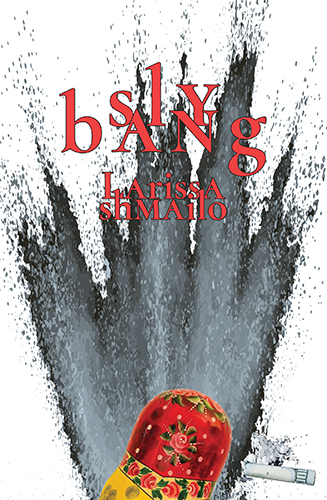Sly Bang
If you are looking for something to get out of your ordinary line of thinking, Larissa Shmailo’s Sly Bang ought to do the trick. The book is a psychological sci-fi filled with nonsensical gadgets, absurd dialogue, and all-out madness, a battle royale of good against evil, of womanhood against male perversion that follows William Burroughs’s Naked Lunch in reverse, if we consider the gender roles of the protagonists. Lovers of Nikolai Gogol’s Madman’s Diary and Samuel Beckett’s Waiting for Godot and Franz Kafka’s stories will also enjoy this book, as opposed to religious and concrete minds who by all means should stay away from a book like this.
—Darryl Wawa
What do you do when there is an “army of serial killers, mad scientists, and ultrarich sociopaths” after you?
Why, you summon your alter, “Larissa Ekaterina Anastasia Nikolayevna Romanova, tsaritsa of all the Russias,” and embark upon Larissa Shmailo’s cornucopiac literary odyssey, Sly Bang, of course.
From Nietzsche’s “what doesn’t kill me makes me stronger” and Lady Gaga’s meat dress to sadistic cult leaders and space Nazis, this sci-fi fantasy thriller is chock-full of surprises at every turn. I mean, the lead character, Upper West Side, Manhattanite Nora, is a multiple personality FBI agent/possible alien with an affinity for serial killers who telepathically communicates with giant prehistoric birds, and as luck would have it, writes uncannily brilliant poetry (journal entries).
Yes.
There is a lot going on in this book.
In my opinion, the (quintessentially Shmailo) “Interlude” is where Sly Bang lives and breathes. It is the much anticipated doorway through which the reader officially exits suspended disbelief, and enters Nora’s world —her real world—and introduces, through beautifully crafted poems, the backstory of Nora; a tragic tale of horrific abuse, betrayal, and ultimately, survival.
This stretch of writing, which jets the reader back to World War II, Nora’s camp family history, is nothing short of masterful, and reminiscent of Shmailo’s previous offering, Patient Women. The poem “Warsaw Ghetto” itself is well worth the price of admission.
Generously infused throughout with humor, ebullient psychosexualism, and quasi-hypothetical political scenarios, this manic mind-trip, where alternate realities collide full-force culminating in orgasmic fits and fantastical flurries, Sly Bang is a bit like eating chocolate cake on a roller coaster. Crazy. Delicious. Chaos.
—K.R. Copeland
Sly Bang is a whirlwind. And if you are looking for a sedate involvement with linear literature, Sly Bang is not for you. This is the shock of the new in a whirlpool of the past. Just open the book and hang on. This is visceral energy in words.
—RW Spryszak
Larissa Shmailo's sci fi thriller Sly Bang is a twisted and compelling thrill ride of a novel that not only transcends the form of that literary genre— it blows it up. It's a novel about an attempt to destroy the universe by reverse engineering the Big Bang. It deals with taboo subjects and is raunchy. funny and brutally intense. I also like that's there's a character named Brave McQ.
—Michael W McHugh aka McQ
Astounding! Will make you recalibrate the word “risk.”
—Maggie Balistreri
Larissa Shmailo’s Sly Bang is a futuristic hallucinogen of a novel that pervades your consciousness. Our heroine Nora could be the love child of Barbarella and Hunter S. Thompson if she grew up to be a telepathic FBI agent. Her story will make you wonder if all wars are truly fought on the battlefield of the psychosexual female libido.
Cecilia Tan, author of Slow Surrender
Sly Bang is astounding! The “typhoid mary of rape and murder,” having been determined by alien pterodactyls to be “the only non-Nazi in the universe,” teams up with a skinner-alive of pubescent virgins and ardent collector of Rothko daubs. Together they wage war against an Ialdabaoth who intends, just for kicks, to atomize the universe by means of particle accelerators. Hyperspatial scene-shifts are conveyed by telepathy or supercomputer-assisted dialogue that bristles with snappy one-liners paced faster than a meth rant. Somehow, across these solar system-spanning pages, supercharged as they are with psycho-, neurobio- and quantum-physical erudition, the plot comes across vivid as anything Tolstoy ever evoked with his most considered panoramic prose. Larissa Shmailo’s Sly Bang is like nothing that has ever been seen, or heard, anywhere.
Tom Bradley, author of Useful Despair
In this breakneck, futuristic, socio-sexual-psychological thriller, Larissa Shmailo tells the story of Nora Volkhonsky, a smart FBI agent targeted by multiple evildoers. As bad guys and worse guys close in on her, Nora’s main goal is to survive. She is helped somewhat by her “telepathic” powers, but her experience is often more dream than reality. “Who was sending these clangs and hoodoo messages? Who was receiving hers? Who wanted her insane or dead?” Fasten your seatbelt as you ride along a wicked highway with Sly Bang’s tough, spirited heroine.
Thaddeus Rutkowski, author of Border Crossings
Michael’s voice dropped to a whisper. “I know about the aliens, know about the great pterodactyls who have come to you, and the chick they sent as emissary, also for forgiveness, because you seem to be able to forgive anyone or anything. I still don’t know what they did, because you don’t seem to either, but I am guessing they are serial killers, too, if I know my Nora. Some kind of extraterrestrial Nazis.”
As though the terrestrial ones weren’t enough, Nora thought. She remembered Heidegger, so popular now in ontical and ontological studies, joining the Nazi party, not out of conviction, but to further his career. She never could read him. But Nietzsche, a Russian professor out of some philological institute, maybe the Gorky, had told her that the mad syphilitic’s (or was it cancer, as they now thought?) last words were “Death to anti-Semites.” How he wept when the horse in the street was beaten! She somehow could not separate their critical stances from their lives. Look, just look at the ideologues, at Marx’s children starving and Rousseau’s abandoned. Fine flying on paper, but in reality, nasty, brutish, and short. Was Hobbes short, she wondered.…
Michael shouted through her thoughts. “Nora, where are you? You’re blocking me. Don’t fight me, honey, I really do love you. Would I go to all this trouble, take all these risks, if I didn’t? This is what they sing about, Nora.”
Nora felt herself softening. She felt Michael’s glow. This nut really thought he was in love with her. . .






